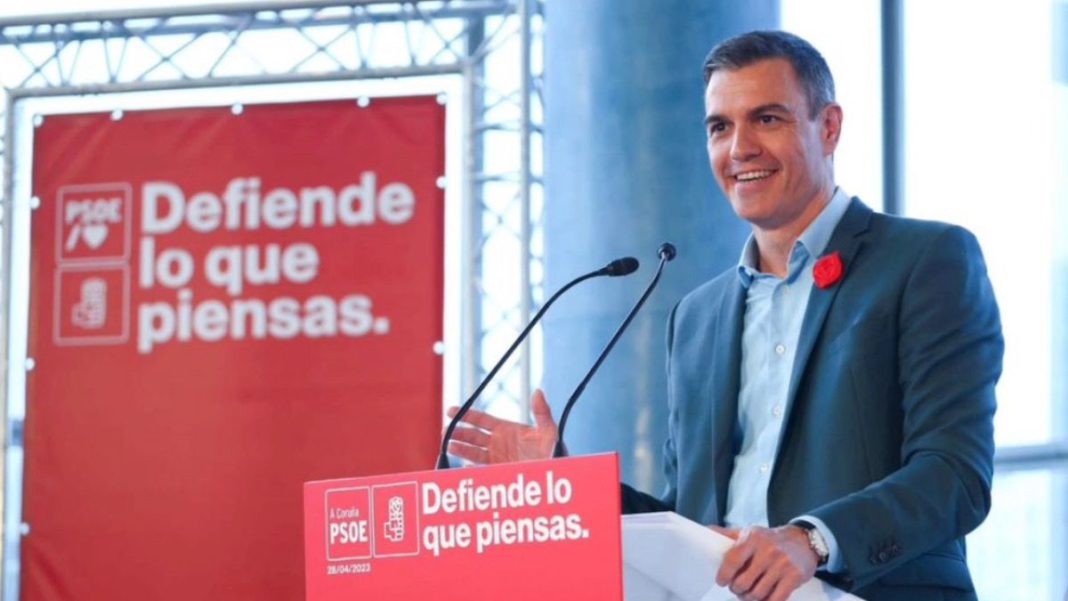SPAIN: Daily right-wing demonstrations against Spain’s acting Prime Minister Pedro Sánchez have become more violent. They underscored growing tensions as he attempted to negotiate a contentious amnesty law.
On Tuesday, approximately 7,000 protesters assembled outside the headquarters of Sánchez’s Socialist Party in Madrid. He is getting ready for an investiture vote, which is anticipated to see him establish a new government and prevent a repeat election. That can only occur if he manages to secure the parliamentary backing of Catalan separatists.
Amid clashes between the police and protesters on Tuesday night, Sánchez shared a defiant message on social media, asserting, “They will not break the Socialist Party.”
Similar protests have been occurring in the Spanish capital and other cities almost daily lately, but this one was the most violent, resulting in 29 police officers and 10 demonstrators sustaining injuries.
In the July general election, the Socialists came in second, trailing behind the conservative People’s Party (PP). However, PP leader Alberto Núñez Feijóo failed to establish a government in a September investiture vote, as he only garnered support from the far-right Vox party among the major parties.
Now it is Sánchez’s turn, and he is almost certain to get enough legislative backing to establish a new government with Sumar, a left-wing alliance. To secure the investiture, he must gain the endorsement of various regional parties, including the pro-independence Together for Catalonia (JxCat) and the Catalan Republican Left (ERC).
In exchange for their backing, these two parties have made demands for an amnesty for several hundred Catalan politicians and activists facing legal consequences, primarily related to their involvement in a failed attempt to secede from Spain in 2017.
While Socialist representatives have reached an agreement with the ERC regarding the content of the amnesty bill, they are currently engaged in ongoing negotiations with JxCat, causing a delay in the investiture vote.
The proposed amnesty would encompass individuals such as Carles Puigdemont from JxCat, the former Catalan premier who spearheaded the independence movement six years ago and has been residing in Belgium to evade Spanish judicial authorities.
Sánchez has positioned the amnesty as the latest in a series of measures introduced by his government aimed at alleviating tensions in Catalonia related to territorial issues.
In 2021, his administration granted pardons to nine leaders imprisoned for their involvement in the failed secession attempt. Furthermore, it modified the penal code to remove the charge of sedition and alter the misuse of public funds, changes that benefited Catalan separatist leaders.
Previously, Sánchez had considered an amnesty—long requested by many pro-independence Catalans—as unconstitutional, marking a significant and contentious shift in his policy stance.
The right-wing opposition has blamed the socialist leader for exploiting the amnesty only to ensure his own political survival. Additionally, it has been claimed that the move threatens Spain’s territorial unity by breaking the constitution and inciting Catalan separatists to try again for independence.
José María Aznar, the former prime minister of the PP, called Sánchez “a danger for Spanish constitutional democracy,” while Núñez Feijóo called the amnesty “democratic madness.” Both have urged those who support them to demonstrate against the idea by going to the streets.
Despite not being the organiser of the recent protests at Socialist Party facilities, the PP was hesitant to denounce them.
Núñez Feijóo wrote on social media, “Pedro Sánchez is to blame for the social unrest,” before stating on Wednesday that “violence has no place in democracy.”
Santiago Abascal, leader of the far-right Vox party, has called for a “permanent, continuous, and escalating mobilisation” against the amnesty. He also urged police officers to disregard “unlawful” orders from their superiors during protests.
Abascal and other Vox leaders were present at the protests in Madrid, where other far-right organizations had also joined them.
Even though members of the Socialist Party voted to support the agreement with ERC and JxCat in a ballot that didn’t explicitly mention the amnesty, several seasoned party members have broken ranks and voiced their opposition to the initiative.
Former Socialist Prime Minister Felipe González expressed concerns that the amnesty could disrupt social harmony in Spain by offering special treatment to convicted Catalan politicians. The political divide over the amnesty has been mirrored in the judiciary.
Conservative members of the General Council of the Judiciary (CGPJ), a supervisory body, passed a motion warning of the potential threat to “democracy, fundamental liberties, and the rule of law.” Meanwhile, left-leaning members of the body voted against the motion, and one member boycotted the session altogether.
Also Read: Clashes Erupt as Police Confront Catalan Amnesty Proposal Protesters at Spain’s Socialist Party HQ



